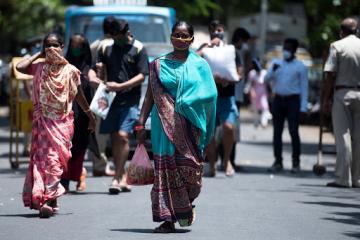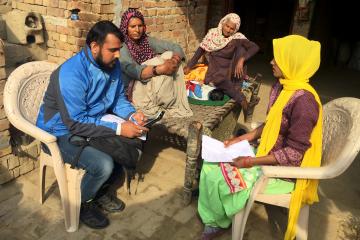
Marking a milestone: Our most-read evaluations

Over the past seventeen years, J-PAL affiliated professors have collectively conducted more than 1,000 completed and ongoing randomized evaluations.
This achievement reflects the tremendous commitment of our affiliated professors, implementing partners, and research staff, alongside the trust of study participants. And this body of research is more important now than ever, as policymaking based on data and evidence is critical for pandemic response and recovery.
Reaching this milestone, we looked back at the three most-read evaluations conducted by J-PAL affiliated researchers within each sector.
- Agriculture: Promoting agricultural technology adoption has been a key focus of J-PAL's Agriculture sector, which is reflected in its most-read evaluations. Researchers examined the impact of a phone-based agricultural advice service in India and of training for coffee farmers in Rwanda. Another seminal study aimed to encourage farmers to use fertilizer in Kenya and found that small, time-limited discounts on fertilizer may substantially increase usage.
- Crime, Violence, and Conflict: The most-read evaluations in this sector highlight the wide range of potential approaches to prevent, reduce, and manage crime, violence, and conflict, including those that enhance police performance in India, address prison recidivism in the United States, and improve security for people living in urban slums in El Salvador, Mexico, and Uruguay.
- Education: The Education sector at J-PAL seeks to improve access to and delivery of high-quality schooling around the world. Researchers partnered with one of our key partners, Pratham, to understand how to improve learning outcomes in government schools in India through targeted instruction. This pedagogical approach of Teaching at the Right Level is now being scaled up to reach over 60 million students across India and Africa. Other well-read evaluations examined the impacts of a primary school reading program in the Philippines and early childhood education in India.

- Environment, Energy, and Climate Change: With today’s pressing climate issues, effective ways to reduce consumption and promote sustainability are key to improving the health of people and the environment. Two most-read studies in this sector looked at ways to reduce home energy use in the United States or plastic bags in supermarkets in Mexico. Another landmark study investigated the impact of improved cookstoves on indoor air pollution in India.
- Finance: J-PAL affiliated researchers pioneered the use of randomized evaluations to understand the take-up and impacts of microcredit, leading to some of the earliest work on the topic. For example, researchers evaluated the impact of microcredit in Hyderabad, India and demand for microloans in South Africa, as well as village loan and savings groups in Uganda.
- Firms: Our newest sector focuses on how best to help firms grow and what are firms’ impacts on workers and the environment. As companies increasingly adopt more flexible working arrangements, this study from China illustrates how working from home can increase employee’s productivity and job satisfaction. Other most-read evaluations looked at improving firm productivity through management consulting and increasing compliance with environmental regulations through audits in India.
- Gender: While Gender may be one of our newest sectors, J-PAL affiliated researchers have always been at the forefront of studying ways to promote gender equality in other sectors. Two of the most-read evaluations investigated potential ways to increase girl’s schooling through providing merit-based scholarships in Kenya and sanitary products in Nepal. In addition, researchers studied the effectiveness of offering women contraceptives in private or with their partner in Zambia.

- Health: One of the earliest studies by J-PAL affiliated researchers was on the impacts of a school-based deworming program in Kenya. Other well-read evaluations looked at the impact of a national conditional cash transfer program in Mexico on health outcomes, as well as boosting immunization rates in India through regular camps and incentives.
- Labor Markets: The top two evaluations in this sector focused on discrimination: racial discrimination in hiring in the United States—the most-read evaluation on our website—and discrimination against skilled immigrants in Canada. Another important question in the sector is how to ensure people have the right skills to secure a job, as researchers investigated in a study on vocational training for youth in Malawi.
- Political Economy and Governance: Voting is often a hot topic, especially during an election cycle. Most-read evaluations looked at the role of media and party affiliation in shaping political views in the United States. Internationally, researchers found that hosting town hall meetings in the Philippines were effective in increasing vote shares among societal groups for which the party platforms were designed.
In addition to some of these classic evaluations, we’re excited to see our evaluations database continue to grow—including recent studies evaluating the health, educational, and economic responses to the coronavirus pandemic. Through hard work and strong partnerships, we look forward to building upon this momentum in the years to come.



